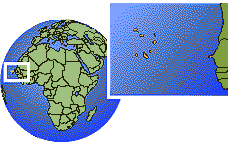
Cape Verde


Formal Name
Cape Verde (republic),
republic, comprising the Cape Verde Islands, in the Atlantic Ocean, due west of the westernmost point of Africa, Cape Verde. The archipelago consists of ten islands and five islets, which are divided into windward and leeward groups. The windward group on the north includes Santo Antão, São Vicente, São Nicolau, Sal, and Boa Vista; the leeward group on the south includes São Tiago, Brava, Fogo, and Maio. Cape Verde has a total area of approximately 4033 sq km (approximately 1557 sq mi).Land and Resources
The islands are volcanic in origin, and all but three—Sal, Boa Vista, and Maio—are mountainous. The highest point, Pico do Cano (2829 m/9281 ft) on Fogo, is also the group's only active volcano. The climate is tropical and dry and subject to extended droughts. The average annual temperature is about 24° C (about 75° F). The annual rainfall averages about 250 mm (about 10 in) and is concentrated in the months from August to October. Vegetation is sparse and consists of various shrubs, aloes, and other drought-resistant species. Wildlife is also limited and includes lizards, monkeys, wild goats, and a variety of birdlife. Mineral resources are meager and include pozzolana (a volcanic rock used in making cement), salt, and kaolin.
Population
The majority of the people of Cape Verde are of mixed African and European descent and are known as Creoles, or mestiços. Nearly all of the remainder are of pure African stock. The total population (1993 estimate) of Cape Verde was 410,535. The overall density was about 102 persons per sq km (about 263 per sq mi). The official language is Portuguese; the national language, however, is Crioulo, a Creole dialect of Portuguese incorporating many African elements. Roman Catholicism is the dominant religion. The principal urban centers are Praia (population, 1985 estimate, 49,500), the capital, on São Tiago, and Mindelo (1980; 36,746) on São Vicente.
Government
Under the 1980 constitution, as amended, the African Party for the Independence of Cape Verde (PAICV) was the sole legal political party; the president was chosen by the National Assembly, the country's legislative body. Reforms introduced in 1990 provided for free, popular, multiparty elections for president and parliament. In the 1991 voting, the PAICV lost to the newly formed Movement for Democracy.
Economy
Farming, fishing, and construction are the chief economic activities. The principal subsistence crops are corn, beans, cassava, sugar-cane, and bananas. Some coffee, bananas, and palm products are exported. Tuna and lobsters are taken from surrounding waters, and goats, pigs, and cattle are raised. Industries include sugar refining, fish processing, tobacco processing, and the distilling of liquors. The ports of Mindelo and Porto Novo serve as transatlantic fueling stops, and an international airport is located on Sal. The country's basic unit of currency is the Cape Verde escudo (74.079 escudos equal U.S.$1; 1993).
History
The islands were used by Senegalese fishers before the first Europeans arrived, about 1456. They were claimed by Portugal in 1460; Portuguese settlers began to land shortly afterward. In 1495 the archipelago was declared a Crown possession, and slaves were subsequently imported from the African continent to cultivate the land. After gaining prosperity, the islands became attractive to pirates and foreign raiders—English, Dutch, and French—who repeatedly attacked during the following centuries. When the slave trade (for which the islands had served as a port of call) was abolished in 1876, their importance dwindled, although a coaling station and a submarine cable station at Mindelo still attracted many ships until World War I. Trade increased again toward the middle of the 20th century.
Like other Portuguese possessions in Africa, the islands were designated an overseas province rather than a colony, in 1951. Unlike the other territories, however, Cape Verde had relatively little agitation for independence until the 1970s. After the coup in Portugal in April 1974, self-determination was promised to the archipelago, and it became independent on July 5, 1975. Under its first president, Aristides Pereira, Cape Verde was a one-party state, nonaligned in foreign policy but heavily dependent on Western aid. Reforms enacted in 1990 provided for the country's first free presidential election, won by Antonio Mascarenhas Monteiro in 1991.